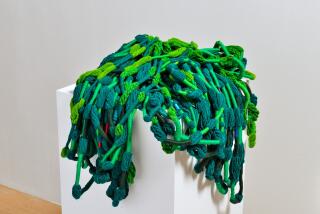Why Learn? Why Live? : The Humanities Defend Against Life as a Cog
- Share via
Essentially, education is a question of purposes: Why learn? Why teach? Once that’s settled, we can talk about what and how.
If efficiency in the realm of the known is what’s wanted, technical training suffices. It produces versions of things, efficient cogs, human carbon paper at worst and human computer programs at best. It stamps out human components for jobs that range from middle management down, employees who devote a prescribed time, in exchange for a prescribed sum of money, to work on problems within the limits of their mapped-out competencies. They spend eight hours a night gearing up for their eight-hour day, and the eight remaining hours trying to justify the other sixteen.
How? With pleasures that threaten to become boring. Many cling to interests that have little to do with their lives. They root for teams, watch soaps or flicks or horses, hate distant enemies and love comfortable gods, challenge the odds at Vegas or on commodities. Some seek out anodynes and become dependent on them. Some simply despair.
Most of them fail to escape. Cogs may wobble, but they aren’t going anywhere unless the whole machine moves. They can break, of course, but at that point they become useless, maybe even dangerous, to themselves as well as to the machine. Japan has excelled on the technical level, but the costs to the Japanese are as obvious as the benefits. Companies control families, and after business hours the bars fill up with workers seeking release from their mechanized days.
The aim of a liberal education, on the other hand, is to produce humanized days, enhanced human lives. It aims to develop the creators of advances in the arts and sciences, improvements in the social and technological realms, directors of businesses that grow and accommodate themselves to the needs and possibilities of a changing world. It’s the difference between adding the same number six times and realizing that you can multiply, between multiplying and inventing the calculator, between using a computer program and envisioning one. The net result of such an education when successful is an undivided person, one for whom work is a form of recreation and leisure a form of productive openness. For such people, the workday is part of the pleasure and challenge of living. They wear no dour masks for Mondays because they find work, like leisure, to be a fulfilling aspect of their lives, a part funded by the rewards of productive engagement.
Again, if technical efficiency is the goal, the what and how are easy. There’s a body of known material--specified facts, regularized procedures, relevant rules--that gets summed up, charted out, committed to memory where necessary, and obeyed. The process of learning under such circumstances is a form of conditioning: When in doubt, try to remember; if memory fails, look the problem up; if it’s not in the manual, ask a superior; if memory, manual and superior fall short, the problem is insoluble. The unknown gets solved from outside or not at all.
The liberal arts aim precisely at the insoluble. They explore the world speculatively in a quest for vision, the excitement and pleasure of recovering what was known and making inroads into the unknown. They do so not through lists of facts, though lists have a place in them; not through memorizing, though it often helps; not by teaching formulas and techniques, though that, too, must be done; not by counseling subservience, though at times it is unavoidable.
What, then, do the liberal arts teach? Ways of thinking, exploring, understanding, with what Keats called negative capability, the art of seeing and feeling empathetically through the eyes of the other.
By what conjurings do they work?
The magic of crossed boundaries.
It took a physicist, Franz Boas, to bring scientific rigor to anthropology. It took the genius of another Franz, Kafka, to give the 20th Century an image of the social and personal horrors of mid-century history. It took giants of drama and art to give direction to Freud and Jung in their explorations of the psyche. It took historians, psychologists and economic philosophers, among others, to give angles on their work to literary critics, and critics in turn to lend tools of analysis to cultural historians. It took advances in geology to give Darwin a mechanism by which to explain the unique development of animals in different times and areas of the world. Mathematics opened doors for fields as disparate as sociology and physics. African masks inspired Picasso. Chinese characters proved instructive to the Imagists, and the drama of Japan to Yeats. It was a visual image--sitting on a light beam and flying away from a clock--that set Einstein on the quest that yielded a fixed speed for light and relative measures for time and space. And it was probably no accident that in the decades preceding him Impressionist painters were obsessed by the ways in which light works on matter in time.
The Einsteins and Kafkas of the world are rare; the Freuds and Marxes and Boases, too. Not every aspirant can become a Madame Curie or a Virginia Woolf. But people of intelligence and imagination, exposed to the best that has been accomplished so far, not just in their fields of interest but in the known world generally, stand a better chance of contributing. They have a better shot at discovering what they truly enjoy, what they are good at, in which areas they would like to develop their productive energies. If they can be made to see--by example, perhaps--that the best we know is limited and how contemporaries are working to make further discoveries, to qualify the old ones and open new paths by identifying new problems, they can be inspired to take up the baton in their chosen fields of endeavor. In the context of a world rich in other fascinating and potentially related races, they can run their own legs into an uncharted and therefore hope-filled future.
The liberal arts? They are three times visionary: They yield vistas on the past, offer insights into the present and open windows on a future that they themselves will brighten by providing the minds that will shine in it.






